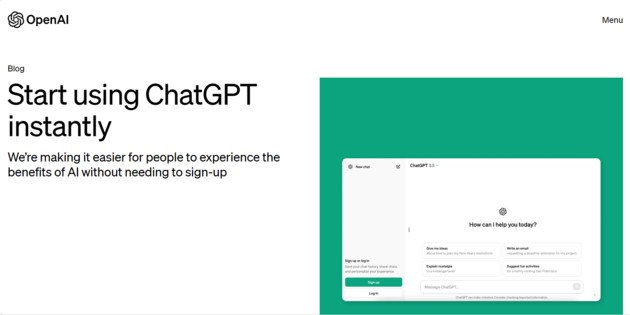
Photo/OpenAI
OpenAI, an AI company, announced on Monday, April 1st, that it will allow users to use ChatGPT directly without registering for the service, making it easier for people to experience the potential of AI.
OpenAI said it will begin rolling out the feature starting Monday, allowing over 100 million users in 185 countries to use ChatGPT to learn new things, find creative inspiration, and get answers to their questions.
In late 2022, OpenAI officially released the AI chatbot ChatGPT, which then set off an AI craze around the world. It can imitate human conversation and perform tasks such as creating long text summaries, writing poems, and even generating creative ideas for theme parties.
According to data analytics firm Similarweb, since ChatGPT's global traffic reached a peak of 1.8 billion visits in May 2023, traffic growth for the popular service has started to slow down.
This should also be the reason why OpenAI lifted the restriction. With the development of AI technology, the existing amount of Internet information may not be enough for technology giants to train more advanced AI systems, and even the lack of high-quality text data may slow down the development of AI technology.
OpenAI also said it has introduced additional content protection measures for users who access ChatGPT without registration, such as blocking prompts and generations in a wider range of categories. But it did not specify the categories.
In addition to the free version of ChatGPT (i.e. ChatGPT3.5), OpenAI will continue to offer paid versions for individuals, teams and businesses.
The company also claims that it may use the content provided by users to help improve its large language model, but users can turn off this feature.
Although users will not need to register to use ChatGPT after that, OpenAI still recommends that users register an account. Because there are many benefits to creating an account, including saving and viewing chat history, sharing chat history, and unlocking additional features such as voice chat and custom instructions.
At the same time, OpenAI launched a new AI tool called Voice Engine. By inputting text and a 15-second audio sample, Voice Engine can generate a natural voice that is very similar to the speaker in the audio, with rich emotions and a realistic voice.
Microsoft (MSFT.O), opens new tab and OpenAI are working on plans for a data center project that could cost as much as $100 billion and include an artificial intelligence supercomputer called "Stargate" set to launch in 2028, The Information reported on Friday.
In the fourth and fifth phases of computing power development of Microsoft and OpenAI, there will be a landmark supercomputer. The supercomputer in the fourth phase is expected to be put into use in 2026, and the supercomputer in the fifth phase has already had a cool code name - Stargate. Microsoft executives hope to launch this supercomputer as soon as 2028. It will also be the one with the highest specifications in a series of supercomputers that Microsoft plans to build in the next six years.
In addition, according to media reports, OpenAI's "next major update" will be released early next year. In a program where Bill Gates talked to Altman earlier this year, the CEO of OpenAI made it clear that the development of GPT-5 is underway. It has also been reported that the release date of GPT-5 will be in the middle of this year, and OpenAI has already provided early version previews to some enterprise users.


 川公网安备 51019002001991号
川公网安备 51019002001991号





